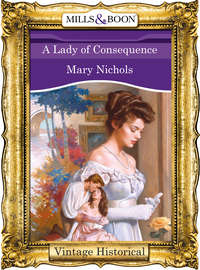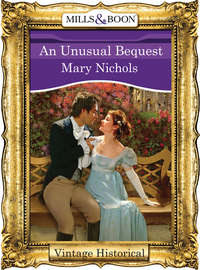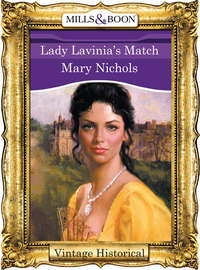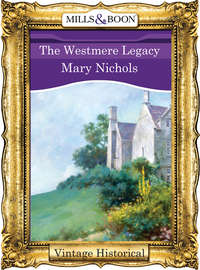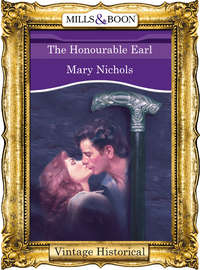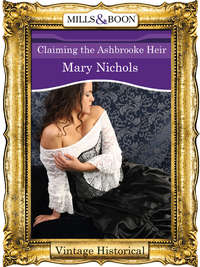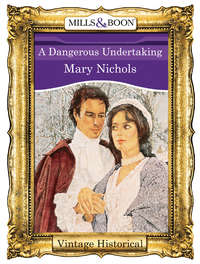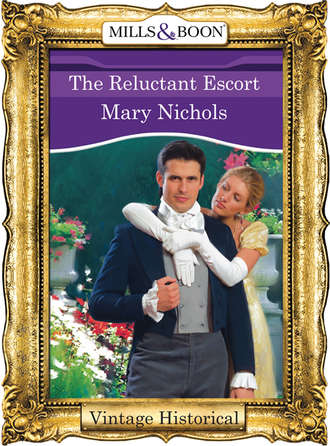
Полная версия
The Reluctant Escort

The Reluctant Escort
Mary Nichols

www.millsandboon.co.uk
Contents
Cover
Title Page
Chapter One
Chapter Two
Chapter Three
Chapter Four
Chapter Five
Chapter Six
Chapter Seven
Chapter Eight
Chapter Nine
Chapter Ten
Chapter Eleven
Chapter Twelve
Copyright
Chapter One
1816
When Duncan first saw Molly, it was an early summer day, with the sun shining and the skylarks hovering above the heath. She was walking on the grass alongside the track with her shoes and stockings in her hand and the hem of her striped dimity skirt wet and muddy. Her cottager hat had fallen down her back on its ribbons and her soft blonde hair lay tangled on her shoulders. He took her for a child, a very pretty child.
She looked up when she heard the slow clop of the horse’s hooves behind her and brushed her wayward hair from her eyes to watch him approach. Strangers were a rarity at Stacey Manor, it being on a promontory of land which was not en route to anywhere, and she concluded he was probably lost. His black stallion, seen with the eyes of someone who adored horses, was a beauty, strong and muscular and somehow out of keeping with the look of the man.
He was a rough sort of fellow, with a half-grown beard and clothes which were crumpled and dusty as if he had slept in them. But he held himself upright and his hands, holding the reins with a light touch, were brown and strong. There were lines about his dark eyes which could have been caused by frequent laughter or continually squinting in strong sunlight. A soldier home from the Peninsular War, she deduced, and immediately imbued him with the character of a hero.
In her mind’s eye she imagined the heat and smoke of battle, heard the gunfire, saw the enemy hordes and the man, slashing this way and that with his sword and emerging triumphant. The only thing wrong with that vision was that the man’s coat was not scarlet but a drab brown and he was not carrying a sword but a rifle in a holster on his saddle.
She waited, expecting him to stop to ask the way, but though his lips twitched into a smile as he passed he did not speak nor even acknowledge her, which piqued her. She hardly ever spoke to anyone but Lady Connaught or the servants and the chance of a little conversation with someone new, however brief, was something to be savoured.
She watched as he continued unhurriedly on his way and then sat on the side of the road to put on her stockings and shoes. Her feet were still wet from paddling in the brook and the footwear was tight and uncomfortable.
She had seen the green and blue flash of a kingfisher swooping along the bank and had waded into the shallow water to see it better. She ought to have known she would startle it and it would abandon its prey to sit in a tree overhanging the water until she had left its domain. And then she had spotted a trout under the bank and tried to catch it as she had seen Jeremy Bland, the poacher, do, but it, like the kingfisher, was gone in the blinking of an eye.
She had turned for home, knowing she would be in for another scolding from her godmother if she saw the state she was in. ‘Molly Madcap’, Lady Connaught called her. And though she grumbled and threatened, Molly knew her bark was far worse than her bite and she would escape punishment. Besides, what could her ladyship do, except lock her in her room? And that was easy to escape from. There was enough ivy clinging to the walls of the old house to make a secure ladder from her window to the ground.
There was no other punishment available, no social occasions she could ban her from attending, no friends she could be forbidden to see, no shops she could be barred from visiting, unless you went to Norwich or King’s Lynn, which the old lady did twice a year. Molly hadn’t been staying with her long enough to have enjoyed that experience yet, but she didn’t hold out much hope that it would be the adventure she craved. She was bored. Even the stranger had ignored her. She might as well be invisible.
Once in sight of the big house, standing on its promontory, four-square to the North Sea, she hurried her pace, darting between the scattered shrubs which were euphemistically called a garden, and in at the kitchen door.
‘Lord a’mercy, Miss Molly!’ Cook exclaimed. ‘What have you been up to now?’
‘Trying to poach a trout for dinner.’ Molly’s smile lit her face; it was the kind of smile that made everyone around her feel more cheerful, however ill their humour had been beforehand. It started in rosy lips and even white teeth and ended in blue eyes, bright as cornflowers. Cook could not resist it, and even the Dowager Lady Connaught found it difficult to maintain her severity. ‘But I’m not sad it escaped. It was too beautiful to be cooked and eaten.’
‘Seventeen years old, you are,’ Cook reminded her. ‘Seventeen. Some young ladies are married at your age. Will you never grow up?’ It was a rhetorical question. Cook knew perfectly well why Molly was still so childlike. It was her mother’s fault. Harriet could never stand competition and Molly showed promise of being even more beautiful than her parent. So the poor girl had been kept a child for as long as possible, but when that would no longer serve she had been brought here to stay with the old lady while Harriet herself had set off for London to find husband number four.
‘Has Aunt Margaret asked for me?’ Lady Connaught was not really her aunt, but a cousin twice removed, but that was how Molly’s mother addressed her and Molly, who had been named after her, had been told to do the same.
‘No, but she will do so soon. We have a visitor…’
‘A visitor?’ Molly brightened, thinking of the stranger who had passed her on the road, and then wondered why her ladyship should entertain such a one. He had come to bring her some stupendous news: a long-lost love found. No, her godmother was too old for such fancies. Then news of some distant battle in which a relative had distinguished himself? But as far as Molly knew, her ladyship had no relatives except the Earl of Connaught who was her grandson, and he lived at Foxtrees on the borders of Hertfordshire and Essex.
Perhaps the stranger had been wounded and had come to be nursed back to health. Oh, that would be best, then he would stay a little, instead of disappearing as all visitors to Stacey Manor were wont to do. ‘Who is it?’
‘You’ll see. I suggest you go and change and do your hair and be quick about it.’
Molly crept up the servants’ stairs to her own room and stripped off her soiled clothes. She washed and dressed again in a pale blue sarcenet gown with a shawl collar of white lace, white stockings and blue kid shoes, then set about brushing out the tangles in her hair. When it was once again lying smooth and shining on her shoulders, she sat down and surveyed herself in the looking-glass, wishing she didn’t look so young; Lady Connaught’s guest would hardly converse with her unless she could make herself look interesting and intelligent. Perhaps it would help if she put her hair up.
She scooped it up in her hand and looked this way and that, then scrabbled in her drawer for combs and pins. Oh, if only she had a lady’s maid to help her! But Mama had said it was not at all necessary at Stacey Manor where the simplest of clothes would be perfectly adequate. She had been right, of course. There was nothing to do, except walk and ride and read, and make occasional visits of a charitable nature to the local villagers.
Pinning up her thick hair was not easy but she achieved it in the end, though one strand refused to be confined and curled lovingly into her neck. She left it there and went down to the withdrawing room.
Lady Connaught, dressed as always in unrelieved black on account of being widowed thirty years before, sat in a high-backed chair by the hearth. Her visitor stood facing her, with his hand on the mantel. He turned when he heard Molly come into the room. She wasn’t sure whether his smile was one of amusement or pleasure, but was gratified that he smiled at all.
He had changed out of the grubby clothes he had been wearing and was now in biscuit-coloured pantaloons and a blue superfine coat, beneath which was a canary-yellow waistcoat with brass buttons and a cravat of white muslin, cleverly tied. He had shaved and his hair had been washed and brushed until it shone. He was now Molly’s idea of a man about town and the war-like fantasies she had been weaving about him faded to be replaced by others.
He was part of the Prince Regent’s court and had been sent to rescue her, to take her to London to be courted by all the eligibles and marry the most handsome and attentive of them all. She might be presented to the Queen at one of her drawing rooms and everyone would say how well she looked.
She knew she should not indulge in these daydreams; it was foolish and childish, as her mother had told her often enough, but they lightened a dull afternoon when there was nothing else to do. Dreams were no substitute for reality and it was the reality she craved.
‘Molly, come and meet…’ Her ladyship paused and looked at him for a moment as if unsure of his identity, then went on, ‘Captain Duncan Stacey. Duncan, this is Mrs Benbright’s daughter, Margaret. You remember Harriet Benbright, do you not?’
Molly did not see the look which passed between them, nor did she hear his murmured comment as she dropped a very deep curtsey before moving forward, wondering if he recognised her as the girl he had seen on the road. She hoped he would not mention it, because it would spark off a jobation from Aunt Margaret and that would be too mortifying. Besides, she didn’t want him to think of her as Miss Molly Madcap, but as a woman with whom he could enjoy social intercourse.
She looked up into his eyes and realised that he was trying to convey a message in them. It was a kind of reassurance and she gave him a conspiratorial smile which startled and then charmed him.
‘Your servant, Miss…’ In the middle of taking her hand and bowing over it, he paused. ‘Forgive me, I do not know which one you belong to.’
He was referring to her mother’s three husbands, she realised. ‘I should have thought it was obvious,’ she said. ‘The first one, Monsieur Martineau, of course. Mama was only seventeen when she married him and I was born less than a year later. It is why we are more like sisters than mother and daughter, so Mama says. If I had been the child of Mr Winters or Colonel Benbright, I would still be a child, would I not?’
‘Of course,’ he said, stifling an inclination to laugh. ‘How stupid of me not to have worked that out for myself. Miss Martineau, I am pleased to make your acquaintance.’
‘Sit down, both of you,’ her ladyship said. ‘Dinner will be served at three. We don’t keep London hours here.’
‘No, I did not think you would,’ he said. He turned to Molly. ‘Miss Martineau, are you enjoying your stay in Norfolk?’
‘Yes, thank you,’ she said.
‘But it is somewhat dull, I think.’
‘Sometimes.’
‘How do you amuse yourself?’
She looked up at him sharply, wondering if his query was leading up to some comment about wandering about the countryside in bare feet. ‘I walk and ride and read, and visit the cottages. The people are very poor, you know, and we must do what we can for them.’
‘Indeed, I do know. It is commendable that you are concerned about them; isn’t that so, my lady?’
‘Yes,’ her ladyship said. ‘Though there is little we can do about the weather and it is the heavy rain that ruined last year’s harvest.’
‘And the end of the war,’ Molly put in. ‘All those soldiers coming home and needing work. No wonder they riot.’
‘Do they?’ he queried. ‘Hereabouts?’
‘Everywhere. You must have been out of the country not to have known about it. But perhaps you are one of those soldiers yourself. I collect you are a captain.’
‘I am, yes.’
‘Were you in any big battles?’
‘Indeed I was.’
‘Which ones? Tell me all about them. Have you ever seen Napoleon Bonaparte? Or spoken to the Duke of Wellington? How much do you think the different styles of leadership of Napoleon and the Duke contributed to the final outcome?’
‘Styles of leadership?’ he echoed, taken aback. It was not a subject he would have expected someone of her years to show an interest in.
‘Why, yes. Napoleon likes to march to battle with a great deal of noise and show and banners flying, while the Duke hides his men away and does not reveal himself until the last minute. He also dresses in a very nondescript way and Napoleon struts like a turkey-cock. Is that not so? Do you think Wellington learned his tactics from Agincourt? Henry V hid his bowmen behind palisades until the enemy was almost upon them, didn’t he?’
‘Goodness, so many questions all at once,’ he said. ‘I hardly know where to begin.’
‘I shouldn’t answer any of them,’ Lady Connaught put in drily. ‘It will only lead to more. Molly’s curiosity is insatiable.’
‘But that is how we learn, is it not?’ Molly said. Ever since she had been taught to read by her father, she had devoured everything she could lay her hands on, whether suitable or not. Simple moralising tales given to her by her nursemaid were soon replaced by novels, both good and bad, and the contents of her succeeding stepfathers’ libraries.
Geography and horticulture and ancient history were digested along with the rudiments of wine-making. And from Colonel Benbright’s vast collection of military books she had read about war and military campaigns and those who directed them. ‘I have read about such things,’ she told the Captain. ‘But it is not the same as talking to someone who was there.’
‘Some things it is better not to know,’ the Captain said. ‘I shall certainly not enlighten you or I shall be blamed for giving you nightmares.’
‘You think I am so lily-livered I have to be protected from anything disagreeable? I assure you, Captain, I am not so lacking in imagination that I do not realise that some things in life are very unpleasant. One must learn about the bad as well as the good.’
‘But better not dwelt upon,’ Lady Connaught said. ‘Duncan, you may escort us in to dinner and I do not want to hear another word about the war. You may tell us what is going on in London instead.’
They moved into the dining room and over a frugal meal of turbot, game pie, vegetables and a fruit flummery Duncan regaled them with the latest gossip from the capital, including the Prince Regent’s long dispute with his wife Caroline, and Princess Charlotte’s love match with Prince Leopold, a story that delighted Molly, who had a very romantic streak in spite of her hoydenish ways. But he had been to no social gatherings and could tell them nothing of the latest fashions.
Duncan stayed behind to smoke a cigar and drink a glass of port after the meal but soon joined them in the withdrawing room where they played three-handed whist until it was time for Molly to retire.
‘You will be staying?’ she enquired, when she bade him goodnight. ‘I shall see you tomorrow? You can tell me all about your experiences then.’
‘Alas, no, I must be gone by daybreak,’ he said. ‘But I shall look forward to meeting you again in the future.’
‘Oh, must you go? We so seldom see anyone interesting at Stacey Manor. It is the most boring of places. Nothing ever happens here. Begging you pardon, Aunt Margaret, but there is so little to do and no one to converse with at all.’
Duncan’s smile was a little crooked. ‘I am afraid if it is social discourse you are looking for I am a poor one to provide it.’ He stood up and bowed to her. ‘Goodnight, Miss Martineau. May your dreams be pleasant ones.’
When she had gone, Duncan settled down again with his grandmother. ‘The poor child must find it very boring here. Why in heaven’s name did Harriet not take her with her to London?’
Lady Connaught smiled. ‘And have everyone wondering how she can be old enough to have a daughter of seventeen? It would certainly be a stumbling block to her own prospects. Harriet has promised Molly a Season when she has landed a wealthy husband for herself. She is still a beautiful woman, not in the first flush of youth but not too old to want a husband.’
‘She has had three already! I should think anyone contemplating marriage with her might well consider how long he might live after the ceremony.’
‘Oh, that is unfair, Duncan. Her first husband, the French diplomat and Molly’s father, was a widower and an old man when she married him. Unfortunately her expectations on his death were not realised; he left his fortune to his first family in France and only a small portion came Harriet’s way.’
‘And her second?’
‘George Winters. He was a wine importer and plump in the pocket when they married, but the blockade of French ports ruined his business and he went to America to look for new sources of supply. He died out there of a fever in 1812 or 1813—I am not sure which it was. That marriage lasted eleven years, but it left Harriet no better off than before. Her third husband was Colonel Benbright…’
‘He was killed at Waterloo. I met him once. An old stick-in-the-mud, who believed it was dishonourable to retreat whatever the circumstances. He had been ordered by Wellington to withdraw from his position, but he chose to ignore the order and took a great many good and brave men with him to their deaths.’ He stopped, hearing again the sound of the unremitting guns and the cries and groans of the wounded men in that terrible conflict.
He had thought himself battle-hardened, but even he had been appalled and sickened by the carnage. And some of it was so unnecessary. Colonel Benbright’s men, not knowing his orders, had obeyed his commands and died at his side. Duncan had been glad not to be one of them, even though, at the time, he had been feeling sick at heart and would have welcomed a good clean death.
‘So now Harriet must find another husband.’ His grandmother broke in on his reverie and brought him sharply back to more mundane matters. ‘Her daughter is an encumbrance, if not a serious rival, so she sent her here to stay with me.’
‘Fustian! She is no more than an attractive child; how can she possibly be in competition with her own mother?’
‘She is not a child, Duncan. She is seventeen, nearly eighteen.’
‘She looks more like fifteen. A mere schoolgirl.’
‘That is Harriet’s fault for trying to keep her young. Poor Molly has not been allowed to grow up, but underneath that childish exterior there is the heart and mind of a young woman who could blossom into a real beauty.’
‘I do not doubt it. It makes me feel like horse-whipping that selfish mother of hers.’
‘That would not serve either. What Molly wants is someone to help her grow up. I can’t do that; I am too old and set in my ways. And Stacey Manor is too isolated.’
‘So?’ he asked, wondering where this conversation was leading.
‘You need to settle down, Duncan. It is about time you abandoned your scapegrace ways and made something of your life.’
‘With Molly Martineau?’ he asked in astonishment.
‘Why not?’
‘Grandmama, have you any idea what sort of life I lead?’
‘Yes, and it is not to your credit. You did not have to abandon your inheritance and take to the road. It was done in a fit of pique…’
‘No, Grandmama, it was not. When I came home and discovered I had been reported killed in action at Vittoria…’
‘The report of that action was detailed enough for no one to doubt it,’ his grandmother put in. ‘You were seen to fall and a French officer dismounted and finished you off with his sword…’
‘He meant to, but charitably changed his mind when he saw I was wounded and took me prisoner instead.’
‘It is a pity you could not have managed to let anyone know you were alive…’
‘I tried, but because I would not give my parole not to attempt to escape I was denied all privileges and no one would take a letter. When I did escape, I brought important intelligence and the Chief sent me back to discover more. I was not free to come home until after Boney surrendered. Too late. My father had died, my title had been usurped, the lady I was to have married had wed my brother and produced an heir.’ He paused, remembering the consternation his return had caused.
If it had not been for that spell as a French prisoner of war and Old Hooknose sending him back behind the lines as an agent, he would have come home long before and claimed his birthright. He would have arrived before his father’s death and there would have been no question of who was the heir. He would be head of the family, running his estates, married to Beth…Married to Beth.
He mused on that for several seconds. It was a prospect which had kept him going all the time he had been in the Peninsula. He had dreamed of it, sure that she was waiting for him. He had spent hours wondering what she might be doing, how she looked, whether she missed him and longed for his return as much as he missed her and looked forward to being reunited with her.
The reality had been very different. Coming home and finding her married to his brother had shaken him to the core. He had been angry and miserable and then anxious only to get away, to leave them to their happiness with each other. He had told them he did not care for the settled life, had not really wanted to be the Earl, that he was a soldier and would remain one. He would not bother them again; they might continue to believe him dead.
He had given a harsh laugh. ‘You may even continue to mourn me,’ he had said.
Hugh, though clearly discomfited, had not tried to dissuade him, but had offered him an income from the estate, saying it was the least he could do. He had refused it, being more concerned with salvaging his pride. He had wished them happy and reported to the War Office for further service. Napoleon’s escape from Elba and the second phase of the war was fortuitous in that respect.
‘What else was Hugh to do?’ she demanded. ‘He truly believed he had become the new heir and was entitled to inherit. We all did. And Beth had expected to marry the Stacey heir ever since she was a child; it was what both families wanted. You can hardly blame her for turning to your brother.’
Logic told him that Hugh and Beth were not at fault, but his heart was still sore. Beth had been so quick to change her allegiance that he began to wonder if, after all, it was Hugh she had wanted all the time and his reported demise had been a blessing. ‘Oh, I can quite see how it happened. My return was an acute embarrassment to everyone. It were better I had stayed dead. I returned to my regiment to give Napoleon another chance to finish me off at Waterloo. ‘Tis a pity he did not.’
‘Don’t be bitter about it, my boy,’ she said softly. ‘You chose to renounce your inheritance for the sake of Beth and their son, so now you must put it behind you and make a fresh start. Careering about the countryside getting into scrapes will not do. It just will not do.’
‘How do you know I have been getting into scrapes?’
‘Why else would you come here? And in the state you were in. I am not a fool, Duncan, even if you take me for one.’
‘Oh, Grandmama, I know you are no fool, but it is better you do not know…’
‘Running from the law, I shouldn’t wonder, or your creditors. Using Stacey Manor as a bolt-hole…’
‘Grandmama…’
‘Enough. You are right—I do not want to know. But what about settling down? What about Molly?’ She laughed lightly. ‘Scapegrace and madcap, it might be the making of you both.’


